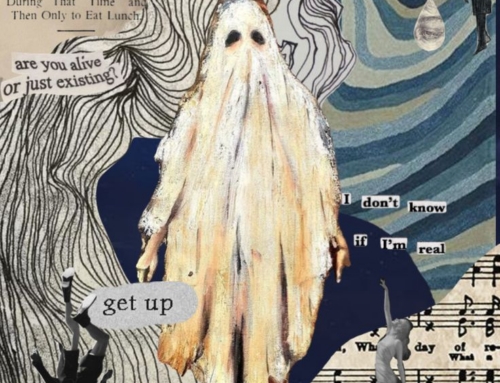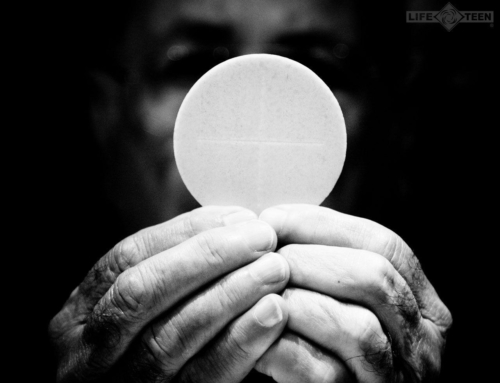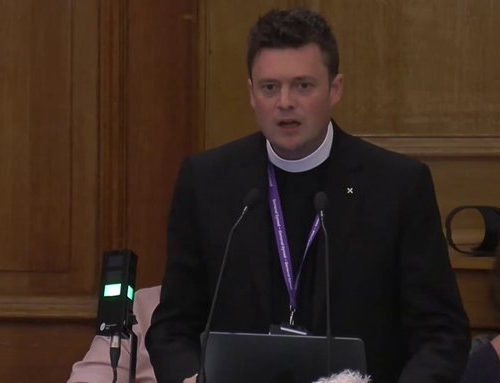When I lived in England I used to go to Mont St Michel every year to make my retreat. One of the reasons I used to love going there was because it was such a fantastic symbol of the church. You might not know it, but the bay that surrounds Mont St Michel is subject to sudden tidal shifts. The sea sweeps in suddenly and the swirling waters in the shallow bay can not only overwhelm a person who has strayed out into the bay, but they also produce pockets of quicksand which cannot be spotted until one is already sucked into them.
The great monastery standing firmly on the rocky island in the middle of the vast, quicksand laden bay is a proud symbol of the permanence and solidity of the Catholic faith in the midst of a dangerous and swirling current of events and circumstances.
It is no co-incidence that Jesus saying, “You are Peter and on this Rock I will build my church” and the parable of the wise man who built his house upon the rock are both recorded in the same gospel.
Matthew records both stories because one complements the other. The catechism teaches that the church is built not only on the rock of Peter as a person, but also on the firm foundation of his faith in Jesus as the Son of God.
Simon Peter holds the first place in the college of the Twelve;283 Jesus entrusted a unique mission to him. Through a revelation from the Father, Peter had confessed: “You are the Christ, the Son of the living God.” Our Lord then declared to him: “You are Peter, and on this rock I will build my Church, and the gates of Hades will not prevail against it.”284 Christ, the “living Stone”,285 thus assures his Church, built on Peter, of victory over the powers of death. Because of the faith he confessed Peter will remain the unshakable rock of the Church. His mission will be to keep this faith from every lapse and to strengthen his brothers in it.
The primary mission of the pope, therefore, as the successor of Peter is to define and defend the foundation of faith. Last wee the leading theologian, Fr Weinandy spoke of his concerns that Pope Francis is weakening the foundation of faith with subjective statements, and the appointment of bishops who seem heterodox in their opinions and actions.
Now London’s Catholic Herald reports that another prominent writer has criticized the Holy Father.
Vittorio Messori, who came to prominence after interviewing Cardinal Joseph Ratzinger in 1984 for the book The Ratzinger Report, said the Pope is in danger of making the same mistake as Protestants by reinterpreting doctrine and undermining the “stability and firmness of the Catholic Church”.
In an article for Italian magazine Il Timone, translated by the National Catholic Register, Messori started by criticising a “disconcerting interview” with the Jesuit superior general Fr Arturo de Sosa.
He accused Fr de Sosa of effectively “‘liquefying’ the Gospel itself” by saying Jesus’s words were not recorded on tape and “we don’t know exactly what he said”, meaning we can “adapt” the Gospel according to the times.
I’m not sure Pope Francis is guilty as charged, but I’m certain some of his appointees and members of his team are.
However this problem is not quite so easy as a brief media report suggests. We should not put people into boxes marked “Rigid” and “Floppy”.
In fact, in everyday Catholic life it is the work of the priest and bishops to constantly struggle with the truth of the gospel and the demands of the culture and time in which we live. In fact when you read the history of the Catholic Church you come to realize that in every age the church has wrestled with this question: “How do we connect the teachings of the Lord to the age and culture in which we live?”
This is the constant tension in every sermon and in every missionary effort. It is also the daily work of the parish priest who meets his people and realizes that they (and he) are struggling to live up to the high calling of being a disciple of Jesus Christ. How do I deal with the broken marriage, the results of poor catechesis, the person with addictions, the poor whose problems are so enormous that I despair?
There are two ways to resolve the problem. The first is to meet people where they are and help them to first see the high calling of God in Christ Jesus, and then use the tools of forgiveness and mercy the church holds to help them with their struggle. So, for example, a person struggling with a porn addiction is helped with confession, counseling personal support and compassion. A person who faces a marriage breakdown is assisted through the annulment process. The young person struggling with guilt is assured of forgiveness and healing in confession. A person struggling with same sex attraction is offered friendship, advice and support in pursuing the life of chastity.
The first way never condemns and judges, but it also never changes the gospel. It never compromises the message, but always offers assistance for those who are weak.
The second way, out of a misguided sense of compassion, attempts to change the message. It tries to lower the bar and allow those who are struggling to make up their own rules. So, out of a misguided attempt at mercy priests will tell gay men that they were born that way and God made them that way and it is ok if they have a “husband.” The second way says, “It is ok for divorced and remarried people to receive communion if their particular situation is especially difficult.” The second way says, “Nowadays it is too difficult for people to not use artificial contraception. They should follow their own conscience. That is a man made rule.” The second way says, “Abortion is a sad choice, but we must not condemn. Instead we must work to change the underlying causes of abortion which are poverty and a lack of sex education.”
Let’s be clear. The second way is a false religion. It is not the gospel of Jesus Christ. It is the gospel you would make up if you had sat down to invent your own religion. It is the religion of worldly wisdom: utilitarianism. Utilitarianism is the philosophy that makes moral choices according to what works not according to an external, objective, revealed moral code. (I encourage you to read my full article on utilitarianism here.)
The second way is nothing new. Christians have always been tempted to adjust the gospel according to the spirit of the age. This has been the constant great temptation for the disciples of Jesus Christ, and I think it was the essential temptation to which Judas succumbed. He wanted to re-make Jesus according to what he saw as being important. He wanted Jesus to conform to his notions of compassion and political expediency.
The second way pretends to be compassionate and merciful, but it is neither. Let us use the analogy of the sports coach. The coach wants his team to win the game and so he institutes a strict training regime. Let’s say this regime includes a strict, no junk food diet. Then after practice the team members say, “We’re heading down to McDonald’s to pig out.” The coach is not being merciful or compassionate when he yells, “You guys choose. Be on the team or eat a Big Mac, fries and milkshake!” The coach is not merciful or compassionate if he says, “Well ok fellas. Enjoy yourself, but try harder next time…” No. This is not mercy this is weakness. The merciful coach says, “Whoa. Guys. You know the rules. If you’re hungry eat another apple. Sorry about that and tell you what–after we win the game on Friday I’ll get pizza for everybody.”
When Catholic leaders therefore change the rules out of misguided compassion or a wrong headed notion of mercy they are not doing anybody any real favors.
Instead, they’re replacing the rock on which the faith is founded with quicksand.
Go here to learn about my new book Mystery of the Magi-The Quest to Identify the Three Wise Men.







Quote from above: “He [We] wanted Jesus to conform to his [our] notions of compassion and political expediency.”
The first “HE” was Lucifer. We call him Satan, the Devil. And the Devil is constantly working us to conform Christ to OUR [the Devil’s] notions. Many great Saints struggled with this first and greatest temptation (in my estimation).
There were many who saw Jesus face to face, listened to Him teach, and watched him perform miracles. And they walked away because, in some way, Christ did not conform to their expectations. The powerful had Christ Crucified. The ‘our notion first’ approach has caused now some 30,000 “Christian” denominations and countless CINOs – Catholics In Name Only.
We know we are imperfect, we are weak regardless of how strong we think we are. We sin. Quite often our sin is a habit we don’t think we have the strength to break. We are conflicted so we try to ease the pain by saying it is OK for me to do this serious sin regularly; God still loves me.
Well, yes, God still loves us. And He is patient. But we cannot build a better relationship with God as long as we try to conform Jesus to our notions of compassion and political expediency. We cannot receive Holy Eucharist without first receiving the Sacrament of Reconciliation; without first truly admitting we are wrong, we are truly sorry, we are willing to do our penance, and we are constantly asking for God’s Grace to amend our lives.
Step One for all of us: Open our minds and hearts to God’s Will, no longer putting our notions first. It takes much time and good spiritual direction. Until then, respect God and only receive Holy Eucharist after a truly good Confession.